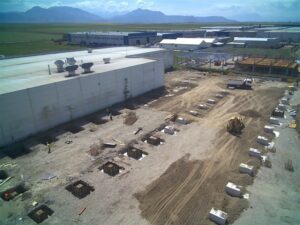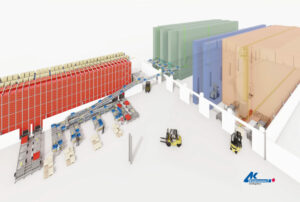

Few industries understand the importance of efficiency as profoundly as supply chain and logistics operators. In fact, the entire business model hinges on eking out incremental enhancements that collectively yield substantial benefits, say BluQube.
Numerous strategies in the logistics sector, such as reverse logistics, process automation, inventory management, and technological innovations, are widely acknowledged and documented.
Yet, for all the focus on operational effectiveness and efficiency, non-core back-office functions like accounting systems often receive less attention. Here a more ‘make-do’ approach can prevail which runs counter to the DNA of organisations that rightly have inefficient practices in their crosshairs.
Logistics companies’ accounting function today extends beyond the mere handling of invoices and billing. Just as sophisticated logistics software provides managers with comprehensive insights into the supply chain, modern accounting software offers a holistic view of operational data. This can be invaluable in equipping organisations with the necessary insights to react promptly and identify efficiencies that can help mitigate ongoing challenges.
Unleashing Resources
Just as the finance department never operates in a silo, financial software needs to be able to work with the necessary programmes and processes to be truly effective. Interoperable software streamlines information exchange with third-party providers, eliminating the need for manual integration and significantly saving time. Inputting information once automatically replicates it across all organisational systems, reducing data discrepancies and time-consuming tasks. This efficiency proves vital for overcoming challenges posed by disparate systems, contributing to the overall health of logistics organisations in times of shortages and heightened competition.
Automation and Employee Satisfaction
Interoperable systems, like any form of automation, liberates employees from monotonous or formulaic tasks, fostering job satisfaction and fulfilment. This liberated time allows organisations to reallocate resources to more strategic areas, enhancing overall productivity.
Empowering Data-Driven Decisions
Effective interaction with data from various business areas transforms financial software into a powerful performance insight and decision support mechanism. It aids in identifying production roadblocks and extracting broader business information for flash reports, saving considerable time compared to manual data collation and report writing. Organisations embracing this approach gain valuable insights that inform their strategy, giving them a competitive edge over those with siloed systems.
Futureproofing Amid Uncertainty
In a world of geopolitical and economic uncertainties, where demand fluctuates rapidly, crafting the ideal supply chain can be daunting. However, system interoperability plays a pivotal role in supporting organisations’ agility and flexibility. It facilitates seamless integration of new automation solutions into existing networks, enabling data sharing without the complexities of merging disparate systems or dismantling existing infrastructure.
As interoperability gains traction in the realm of logistics software and automation solutions, organisations gain the freedom to curate their warehouse or logistics infrastructure from a diverse range of specialised providers, ensuring that each component meets its unique requirements. This approach contrasts with generic solutions that often fall short in functionality and performance.
This enhanced level of customisation and choice fosters a more resilient and adaptable supply chain, allowing organisations to respond promptly to demand shifts, seamlessly integrate new technologies, and optimise operations across the entire supply chain. System interoperability empowers businesses to navigate the complexities of modern logistics with agility and resilience.
Marginal Advantages
While interoperability may not be a groundbreaking software function, its growing significance in addressing challenges and enhancing efficiency is undeniable. It eradicates data silos, liberates staff, improves visibility, and transforms performance insight into a robust decision-support mechanism. Professionals seeking system upgrades should prioritise interoperability and future requirements, recognising that even small changes can yield significant impacts in the quest for logistics efficiency.
- SEO Powered Content & PR Distribution. Get Amplified Today.
- PlatoData.Network Vertical Generative Ai. Empower Yourself. Access Here.
- PlatoAiStream. Web3 Intelligence. Knowledge Amplified. Access Here.
- PlatoESG. Carbon, CleanTech, Energy, Environment, Solar, Waste Management. Access Here.
- PlatoHealth. Biotech and Clinical Trials Intelligence. Access Here.
- Source: https://www.logisticsbusiness.com/it-in-logistics/wms-scm-software/gaining-marginal-advantages-in-logistics/
- :is
- :not
- :where
- a
- Able
- Accounting
- accounting software
- acknowledged
- across
- addressing
- advantages
- aids
- All
- Allowing
- allows
- Amid
- and
- any
- approach
- ARE
- areas
- AS
- attention
- automatically
- Automation
- BE
- benefits
- Beyond
- billing
- broader
- business
- business model
- businesses
- by
- CAN
- chain
- challenges
- Changes
- choice
- CO
- collectively
- compared
- competition
- competitive
- complexities
- component
- comprehensive
- considerable
- contrasts
- contributing
- Counter
- crosshairs
- curate
- data
- data sharing
- data-driven
- decision
- Demand
- Department
- dismantling
- disparate
- diverse
- dna
- documented
- each
- Economic
- Edge
- Effective
- effectiveness
- efficiencies
- efficiency
- eliminating
- embracing
- Employee
- employees
- empowers
- enabling
- enhanced
- enhancements
- enhancing
- ensuring
- Entire
- Even
- exchange
- existing
- extends
- facilitates
- fact
- Fall
- finance
- financial
- Flash
- Flexibility
- fluctuates
- Focus
- For
- form
- fostering
- fosters
- Freedom
- from
- function
- functionality
- functions
- future
- Gain
- gaining
- Gains
- geopolitical
- Giving
- groundbreaking
- Growing
- Handling
- Have
- Health
- heightened
- help
- here
- hinges
- holistic
- However
- HTTPS
- ideal
- identify
- identifying
- Impacts
- importance
- improves
- in
- incremental
- industries
- inefficient
- inform
- information
- Infrastructure
- innovations
- inputting
- insight
- insights
- integrate
- integration
- interaction
- Interoperability
- interoperable
- into
- invaluable
- inventory
- Inventory Management
- invoices
- IT
- ITS
- Job
- just
- less
- Level
- like
- logistics
- management
- Managers
- manual
- May..
- mechanism
- Meets
- mere
- merging
- Mitigate
- model
- Modern
- more
- Navigate
- necessary
- Need
- needs
- networks
- never
- New
- New technologies
- of
- Offers
- often
- on
- once
- ongoing
- operates
- operational
- Operations
- operators
- optimise
- or
- Organisations
- out
- over
- overall
- overcoming
- performance
- pivotal
- plato
- Plato Data Intelligence
- PlatoData
- plays
- posed
- powerful
- practices
- prioritise
- process
- Process Automation
- processes
- Production
- productivity
- professionals
- profoundly
- programmes
- proves
- providers
- provides
- quest
- range
- rapidly
- React
- realm
- receive
- recognising
- reducing
- replicates
- report
- Reports
- Requirements
- resilience
- resilient
- Resources
- Respond
- reverse
- roadblocks
- robust
- Role
- runs
- satisfaction
- saving
- say
- seamless
- seamlessly
- sector
- seeking
- sharing
- Shifts
- Short
- shortages
- should
- significance
- significant
- significantly
- siloed
- silos
- small
- Software
- Solutions
- sophisticated
- specialised
- Strategic
- strategies
- Strategy
- streamlines
- substantial
- such
- supply
- supply chain
- support
- Supporting
- system
- Systems
- tasks
- technological
- Technologies
- that
- The
- their
- Them
- third-party
- this
- those
- time
- time-consuming
- times
- to
- today
- traction
- transforms
- truly
- uncertainties
- undeniable
- understand
- unique
- upgrades
- Valuable
- various
- View
- visibility
- vital
- Warehouse
- which
- widely
- with
- without
- Work
- world
- writing
- Yield
- zephyrnet












